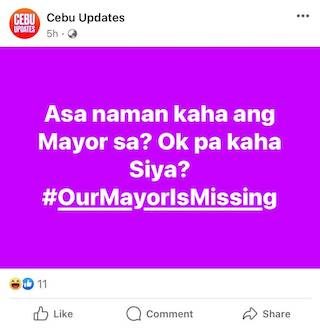SUMMARY
This is AI generated summarization, which may have errors. For context, always refer to the full article.

READ: Part 1 | How a former City Government Facebook page became a tool for ‘propaganda’
Though midterm elections are yet to happen in 2025, former and incumbent local officials are already expressing their desire to run.
With the upcoming midterm elections, propaganda and stretched facts without context that besmirch the reputation of politicians are being spread on social media to influence political views and election results.
In Cebu City, the ownership of Facebook page, Cebu Updates, is under debate. The city government alleges that it was originally a Public Information Office (PIO) page, now controlled by individuals to serve political interests.
While the illegal access and computer-related identity-theft case filed by the Cebu City government against Cebu Updates program hosts Erwin dela Cerna and Christian Tura is still pending resolution, this case highlights the issue stemming from the lack of social media management policies among local government units (LGUs) to establish their social media accounts as official and institutional.
In this December 2023 post, Cebu Updates used the hashtag #OurMayorIsMissing, and while looking for political leaders is normal, the hashtag used could mislead readers into thinking that the mayor is absent without valid cause.

Rama, however, during that time was in Australia with his family for over a month.
Rama designated Vice Mayor Raymond Alvin Garcia and First Councilor Donaldo “Dondon” Hontiveros as acting mayor and vice mayor, respectively, while he was on leave, a vacation he officially declared.
While Cebu Updates page appears to be critical of Rama, it seems to be selectively friendly to other personalities in Cebu like Metropolitan Cebu Water District (MCWD) chairman Jose Daluz III.
The page also promotes the activities of Panaghiusa Partylist, of which Daluz is president. Some of its posts show officials and members’ visits to various barangays for dialogues.


Sought for his reaction, Daluz, in an interview on March 8, 2024, said that he has no control over Cebu Updates’ postings.
“It seems like Cebu Updates enjoys featuring us. You know with Cebu Updates, they seem quite interested in a lot of things,” he said in Cebuano. He added that he is not aware of the connection between his party’s Facebook page and Cebu Updates. He also said that they impose no restrictions on their page.
Daluz, a lawyer, earlier told the media that he is eyeing the mayoral race in the 2025 midterm elections, though he has yet to officially declare his bid.
Discussions about the 2025 mayoral race in Cebu City are, however, not confined to Rama and Daluz alone. Other probable candidates have also started to surface, such as former Philippine Drug Enforcement Agency regional director Yogi Filemon Ruiz and incumbent city councilor Nestor Archival.
With a following of 340,000 on Facebook, the negative criticisms launched by Cebu Updates against Rama could slightly, if not significantly, impact his reelection bid. Apart from potential damage to his reputation, Cebu Update’s posts against Rama also have the potential to shape the perception of Cebu City voters, leading to a loss of trust.
Some things to watch out for in the coming days are how the Office of the Cebu City Prosecutor will decide on the illegal access and computer-related identity theft complaint filed by city hall against Tura and Dela Cerna, program hosts of Cebu Updates, and whether the city government will succeed in regaining ownership and management of the Facebook page.
And what follows if the city does succeed? Will it shut down the page and delete all its posts when it is acting as Cebu Updates Facebook page?
The rift between Daluz and Rama, former political allies, is also no secret. Rama wanted Daluz replaced as MCWD chairman – initially by MCWD vice chairman Miguelito Pato, and then with retired major general Mel Feliciano.
Daluz, in a May 2023 interview with SunStar’s editor-in-chief emeritus and now opinion writer and columnist, lawyer Pachico Seares, said back then that Panaghiusa is endorsing Rama for congressman or senator in the next elections. This displeased Rama, given his bid for reelection as mayor.
Daluz, who said it was Rama who severed their political alliance, still leads Partido Panaghiusa, while Rama leads Partido Barug – which has been affiliated with PDP-Laban since 2018. Partido Barug formed an alliance with Kugi Uswag Sugbo and Partido Panaghiusa during the 2022 elections.
Daluz and lawyer Floro Casas Jr. are also no strangers to each other. Casas, who served as city administrator during the time of Labella, served as chairman of Partido Panaghiusa.
Daluz and Casas stirred some controversy when the former employees’ union of the MCWD in September 2022 questioned the alleged last-minute accommodation of Casas’ application for assistant general manager then. (READ: Union questions MCWD board of directors over ‘last minute’ accommodation of Casas’ application for assistant general manager)
Daluz, however, has already refuted claims of favoritism. Casas, in Seares’ column on July 23, 2023, admitted being the administrator of the Cebu Updates Page.
Repeated efforts to get Casas’ side through phone calls, text messages, and Facebook Messenger chat went unanswered. We will update this story if he responds.
No policies?
The dispute over the former PIO Facebook page of Cebu city hall could have been avoided, had there been clear policies on responsible and secure social media use and management at the local government level.
Unfortunately, unlike other LGUs, such as the municipal government of Taytay, Rizal in Luzon, these are non-existent in Cebu City.
Given the public benefits of social media platforms and the potential for issues to arise from misuse and abuse, establishing clear policies can mitigate risks and dangers. This can help ensure that government offices are prepared to address any challenges that could arise later on.
According to city councilor Edgardo “Jaypee” Labella II, the Management Information and Computer Services (MICS) at city hall has not yet determined the number of departments and offices maintaining Facebook pages nor the total number of pages representing them.
Labella, in an interview on January 24, acknowledged the absence of established policies or guidelines governing social media accounts used by city hall. He, however, disclosed plans to collaborate with MICS on conducting a study to develop an internal policy or ordinance for the city government.
“My intention here is to prevent the pages from constantly being replaced because it’s an official page. Now, the problem is when the mayor changes, the (office’s) people also change. That’s the big problem,” he said in Cebuano.
Taytay’s Ordinance 778
The 12th municipal council of Taytay, Rizal approved on March 15, 2023, Ordinance No. 778 series of 2023, or “An Ordinance Establishing the Official Social Media Accounts, Platforms and Pages of the Municipality of Taytay and Providing Guidelines for Use, Management and Proper Turnover.”
The ordinance expounded on various aspects of social media account creation, use, management and proper turnover, setting policies on naming convention, agency description, creation and responsibilities of a social media team, content management and restrictions.
The Taytay municipal council acknowledged that the use of social media has become an “integral part” of the public and personal lives of the government and their constituents and it is “imperative” to formulate a policy that will guide government agencies in responsible social media use.
Likewise, although not LGUs, the Department of Social Welfare and Development (DSWD) and the Department of the Interior and Local Government are among the national agencies that have established their social media management guidelines.
The DSWD, for instance, has its Administrative Order 16 series of 2021, which serves as the go-to guidebook for its social media managers and which outlines the agency’s rules of engagement.
“Mismanaged social media accounts by government institutions will be a sign of incompetence and poor public service,” it said.
Ownership
An expert on this issue, who requested anonymity, said a written policy clarifies ownership of a page.
Facebook, for instance, has institutional pages that allow verification. This means that even if an individual leaves, ownership remains with the institution. This measure also ensures accountability – especially if there are any errant officials who have left and will try to use the page for personal benefit. The institution can then go ahead and remove admin access.
Likewise, Department of Information and Communications Technology 7 Director Frederick Amores emphasized that a policy, in the form of an executive order, or better yet an ordinance, would help protect ownership of LGU social media pages.
“We can always send Meta copies of the ordinance and copies of the documentation. So, establish the verification, that’s what Meta needs to verify that you are indeed the legit owner of that page,” he said.
Data privacy lawyer Cecilia Soria also raised the issue of data privacy with the absence of policies among LGU-run social media accounts. She said the current administrators of the former PIO page should delete the information that the page collected when it was still acting as a PIO page. Its continued use as a private entity can already be considered unauthorized, she said.
This includes the information of those who liked and followed the page when it was still acting as a PIO page. But what should social media management policies or guidelines contain?
Need to define policies
A study by University of the Philippines College of Mass Communication professor Clarissa David recommended that written policies specify the agency’s objectives, functions of social media accounts, and establish rules for assigning editing and administrative roles within organizations. The 2016 study was titled, “Social Media Use by Frontline Government Agencies: Review and Recommendations.”
It also suggested establishing rules on tone, voice, language, and style to reflect the agency’s brand, as well as the handling of crises related to social media posts.
The study also said that a written social media policy may also include rules on integration with all other digital channels; policies on privacy, confidentiality (tagging); copyright rules, policies on starting new sites, groups or channels; flowchart of complaint and query handling in the context of the organization, and monitoring and evaluation (that includes regular metrics and target-setting.)
David said in her study that written policies should apply to all social media channels, including Twitter, Facebook, blogs, message boards, image and video sharing sites, and any similar new platforms.
“It is not recommended that agencies have restrictive rules that extend to personal social media pages. In my own opinion, this infringes on the rights of employees to manage a space that is in their personal, not purely professional, sphere,” read a portion of the study.
“However, it is appropriate to put restrictions on any depictions of work product, office-related materials, identities of coworkers, and documents or sensitive information, even on personal FB pages and microblogs,” it added.
Running social media accounts, like Facebook, is now common in government work. It is beneficial as it has a service aspect to it.
Yet the need for social media policies is apparent, at least for the Cebu City government. Such policies can help prevent other local government public information office pages from facing the same fate as Cebu Updates – formerly a source of official city government announcements, now managed by unidentified administrators. – Rappler.com
Wenilyn Sabalo is a community journalist currently affiliated with SunStar Cebu and is an Aries Rufo Journalism fellow of Rappler for 2023-2024.
Add a comment
How does this make you feel?
There are no comments yet. Add your comment to start the conversation.